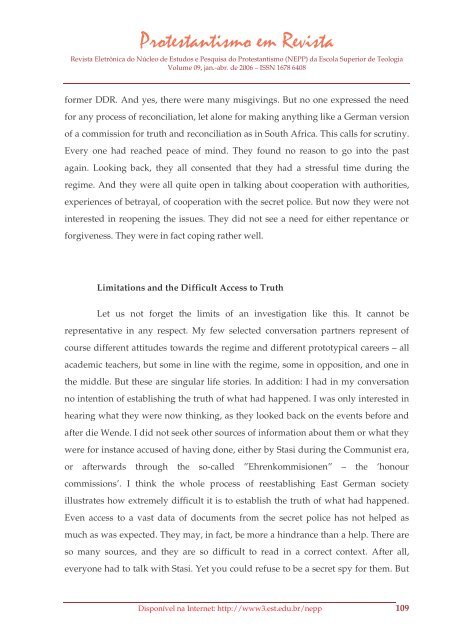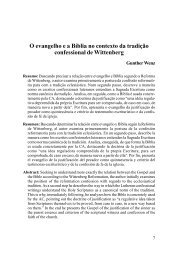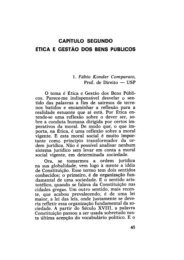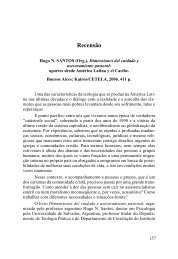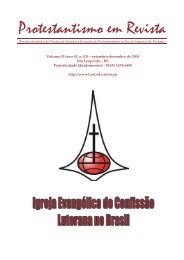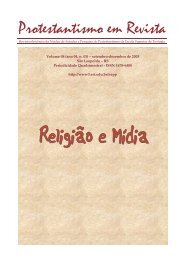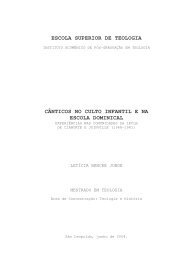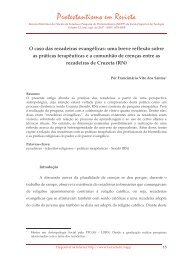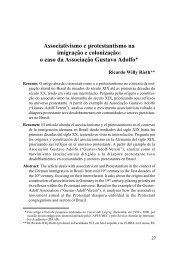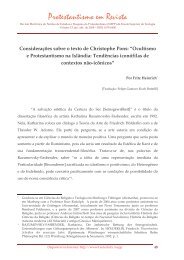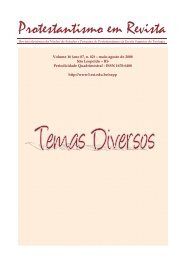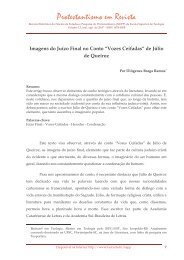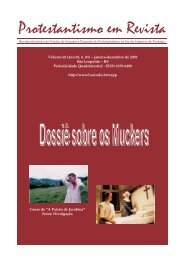Protestantismo em Revista, volume 09 (Ano 05, n.1) - Faculdades EST
Protestantismo em Revista, volume 09 (Ano 05, n.1) - Faculdades EST
Protestantismo em Revista, volume 09 (Ano 05, n.1) - Faculdades EST
Create successful ePaper yourself
Turn your PDF publications into a flip-book with our unique Google optimized e-Paper software.
<strong>Revista</strong> Eletrônica do Núcleo de Estudos e Pesquisa do <strong>Protestantismo</strong> (NEPP) da Escola Superior de TeologiaVolume <strong>09</strong>, jan.-abr. de 2006 – ISSN 1678 6408former DDR. And yes, there were many misgivings. But no one expressed the needfor any process of reconciliation, let alone for making anything like a German versionof a commission for truth and reconciliation as in South Africa. This calls for scrutiny.Every one had reached peace of mind. They found no reason to go into the pastagain. Looking back, they all consented that they had a stressful time during theregime. And they were all quite open in talking about cooperation with authorities,experiences of betrayal, of cooperation with the secret police. But now they were notinterested in reopening the issues. They did not see a need for either repentance orforgiveness. They were in fact coping rather well.Limitations and the Difficult Access to TruthLet us not forget the limits of an investigation like this. It cannot berepresentative in any respect. My few selected conversation partners represent ofcourse different attitudes towards the regime and different prototypical careers – allacad<strong>em</strong>ic teachers, but some in line with the regime, some in opposition, and one inthe middle. But these are singular life stories. In addition: I had in my conversationno intention of establishing the truth of what had happened. I was only interested inhearing what they were now thinking, as they looked back on the events before andafter die Wende. I did not seek other sources of information about th<strong>em</strong> or what theywere for instance accused of having done, either by Stasi during the Communist era,or afterwards through the so-called ”Ehrenkommisionen” – the ‘honourcommissions’. I think the whole process of reestablishing East German societyillustrates how extr<strong>em</strong>ely difficult it is to establish the truth of what had happened.Even access to a vast data of documents from the secret police has not helped asmuch as was expected. They may, in fact, be more a hindrance than a help. There areso many sources, and they are so difficult to read in a correct context. After all,everyone had to talk with Stasi. Yet you could refuse to be a secret spy for th<strong>em</strong>. ButDisponível na Internet: http://www3.est.edu.br/nepp 1<strong>09</strong>


